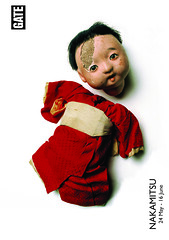Nakamitsu Notes
It is virtually impossible to translate exactly from one idiom to another. A translator and adaptor has to do the best they can in representing the original in heart and spirit yet remaining alive to the sensibilities of a modern audience.
In transforming a Noh play to English, there are not just idioms of language to tackle but a whole theatrical form and culture that are very different to an English or Western world.
There are several ways to attempt this, all beset with problems and possibilities. There are translations which will describe a Noh play more closely to what you may see in a performance in Japan and those that will treat a Noh text in terms of literary criticism. Those types of translations can be brilliant and useful.
However, there are those who will argue that the plays only exist in performance. Japan has no great tradition of reading Noh as literature. My version was written with performance in mind. It is not academic. It is not attempting to be literature.
In attempting to write a version that can be used by English speaking actors from a Western culture, the roots and traditions of classical Japanese Noh will need to be explored.
A strict adherence to the way it might be performed by one of the schools of Noh in Japan is not likely to work for Western actors who do not have the long training of classical Noh performers, let alone all the other aspects that need to go into a classical Noh performance.
Forgetting the traditions of the classical way would be a mistake as well. There needs to be some way to remain true to both a modern sensibility and a classical one.
*
For the Gate production, the introduction of a prologue to Nakamitsu was influenced by the traditional format of presenting a Kyogen before a Noh play in a Noh programme, and by the use of ghosts in Noh plays. It was also inspired by placing the world of Nakamitsu into a context reflecting a modern dilemma.
Giri (duty) vs ninjo (compassion/humanity) is a pivotal topic in Japanese literature and society. Duty does not properly translate the meaning of giri. It is closer to the Roman concept of pietas or the Greek concept of honour, timē / τιμή. It is the sense of “obligation to one’s superiors”.
The choices and arguments fought out by the characters in Nakamitsu seem modern. We face the same dilemmas today between what we ought to do and what we want to do.
In the version for the Gate, we created our own performance language from an understanding that we are not Noh trained but acknowledging the roots and aims of Noh. Our approach uses western psychology and theatre practice and combines that with Noh traditions.
Discussion revolved around an adherence to the elements of a Noh structure, for instance keeping a gesture of weeping where appropriate but informing the gesture with the company’s western theatre practice rather than trying to imitate classical Noh.
It is a collision and fusion of our arts.

